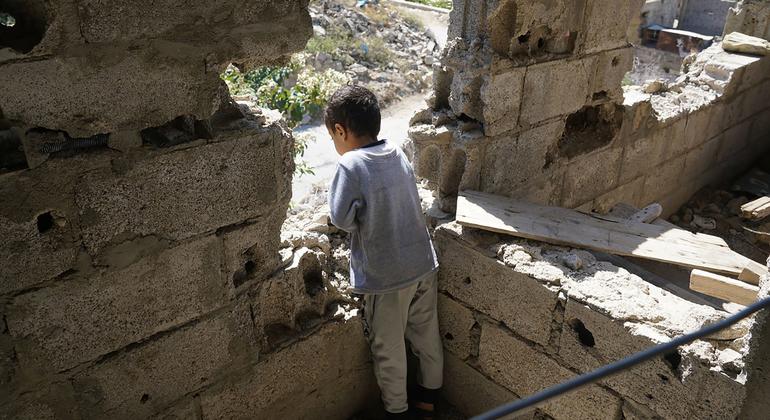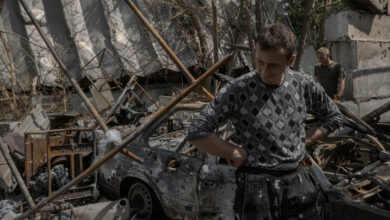More than 11,000 children killed or injured in conflict in Yemen: UNICEF

Agency director Catherine Russell, who has completed a visit to the country, has called for urgent renewal of the ceasefire agreement between the government and the Houthi rebels.
The landmark agreement was initially announced in April and helped to significantly reduce the intensity of the conflict.
However, more than 62 children have been killed or injured during this period since it ended in early October and November 30, UNICEF said.
Fight to survive
Furthermore, at least 74 children were among 164 people killed or injured by landmines and unexploded ordnance between July and September alone.
Ms. Russell visited a hospital in the city of Aden, where she met Yasin, a seven-month-old boy, and his mother, Saba, whose life has become a struggle for survival.
“Thousands of children have died, hundreds of thousands more are at risk of dying from preventable disease or famine,” she said.
“Yasin is just one of many severely malnourished children in Yemen. They all need immediate support because basic services have almost collapsed.”
Young life at risk
During her visit, Ms. Russell launched UNICEF’s USD 10.3 billion fund Humanitarian action for children provides water, sanitation, nutrition, education, health and protective services to children worldwide affected by conflict and natural disasters.
Yemen remains one of the world’s most pressing humanitarian situations. More than 23.4 million people, or three quarters of the population, request support and protection. More than half are children.
UNICEF estimates that 2.2 million children with acute malnutritionincluding nearly 540,000 children under 5 years old are suffering from severe acute malnutrition.

Mothers take their children to a malnutrition prevention and treatment clinic in Taiz, Yemen, supported by the World Food Program (WFP).
More than 17.8 million Yemenis lack access to clean water, sanitation and hygiene services, and the country’s health system has been fragile for many years.
Only half of all health facilities are still in operation, leaving nearly 22 million people – including about 10 million children – without adequate care.
Education under the fire
The war has brought vaccinations to a halt, with 28% of children under the age of one not receiving routine vaccinations.
This situation, along with the lack of access to safe water, means Children are at high risk for disease such as cholera, measles and diphtheria.
Yemen is also facing a serious educational crisiswith enormous long-term consequences for children, UNICEF warns.
Two million boys and girls are currently out of school, a number that could rise to six million because at least one in four schools is destroyed or partially damaged.
Extending the ceasefire agreement
Ms. Russell stressed that if Yemeni children have any chance of a good future, the warring parties, as well as the international community and influencers, must ensure that they are protected. protected and supported.
“That includes kids like Mansour, whom I met at a UNICEF-supported prosthetic and rehabilitation center. His leg was amputated at the knee after he was shot by a sniper. No child has to go through that,” she said.
“The urgent extension of the ceasefire will be positive first step that would allow vital humanitarian access. Ultimately, only a lasting peace will allow families to rebuild their broken lives and start planning for the future.”

A girl eats peanut powder while being treated for malnutrition at a concentration camp in Sa’ana, Yemen.
sponsorship appeal
UNICEF is seeking nearly $484.5 million to respond to the crisis in Yemen throughout 2023, warning that predictable lack of funding puts children’s lives and well-being at risk.
Despite the challenges, the agency was able to implement interventions this year that included support for severe acute malnutrition for more than 260,000 children.
Nearly 1.5 million households receive emergency cash assistance each quarter, benefiting approximately 9 million people.
UNICEF also provides approximately 4.7 million Yemenis with safe and long-lasting access to safe drinking water through truck transport, installation of distribution points, and expansion of the water supply system to camps for vulnerable populations. internally displaced persons.
Other actions include providing measles and polio vaccines to at least 1.6 million children, and supporting maternal, newborn and child health services at 24 hospitals. , providing operational support, as well as providing equipment and supplies.




